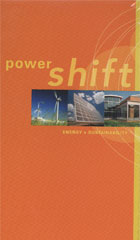
Power Shift 2003
Distributed by The Video Project, 375 Alabama, Suite 490, San Francisco, CA 94110; 800-4-PLANET
Produced by Kirk Bergstrom
Directed by Kirk Bergstrom
VHS, color and b&, 26 min.
Jr. High - Adult
Energy, Environmental Studies, Technology
Date Entered: 10/20/2004
Reviewed by Cliff Glaviano, Coordinator of Cataloging, Bowling Green State University Libraries, Bowling Green, OHThis film, introduced and narrated by Cameron Diaz, quickly points out that the source of all energy available to Earth’s citizens is the Sun, and that our unwise use of energy, particularly of fossil fuels, has resulted in the overproduction of greenhouse gases and a drastic increase in global warming. The dangers of global warming are graphically presented including the dangers of permanent climate change, increasingly severe weather, rising tides and beach erosion, and potential extermination of species. The film then calls for a “power shift” from fossil fuels to clean, renewable energy resources, making the point that we can discover and use renewable/recyclable energy resources over and over again. The technologies discussed include solar electrical energies, hydrogen fuel cells, hybrid automobiles, and wind farms to power our electrical grid. There are nine specific suggestions made as choices to further the power shift to renewable energy. The viewer is encouraged to “imagine the future … make a choice.”
The film is technically excellent, well narrated and edited. Sound quality also is excellent.
Power Shift is a welcome addition to environmental science and technology collections in school and public libraries. It presents a clear argument as to why we must begin to adopt renewable energies. The list of nine specific things that can be done to reduce reliance on fossil fuels is imaginative and may be revealing. For example, viewers may not know that they can specify that in some states they can choose “green” sources of electrical power for their homes. Leads easily to class discussions of what can be done and of who may be part of the solution to our energy problems.